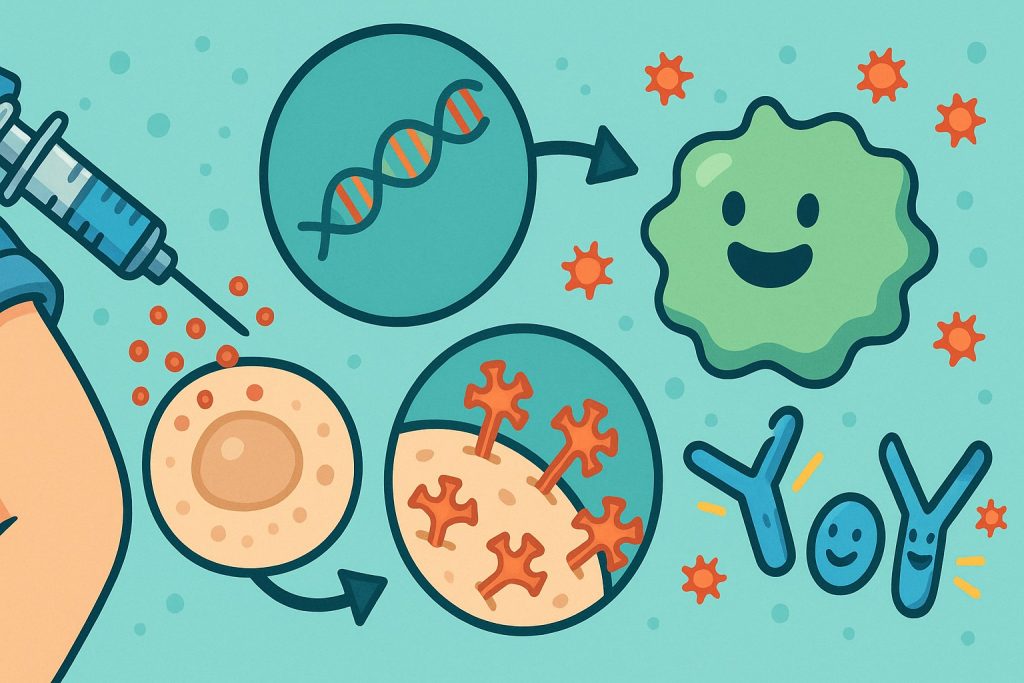mRNA vaccines have become one of the most groundbreaking innovations in modern medicine, especially in the fight against viral infections. Unlike traditional vaccines, they do not contain live or inactivated viruses. Instead, they use a strand of messenger RNA (mRNA) to “teach” the immune system how to recognize and respond to a specific pathogen.
The Structure of mRNA Vaccines
mRNA is a type of genetic code that carries instructions from DNA to the cell’s protein-making machinery. In mRNA vaccines, this code instructs cells to produce a harmless fragment of a virus — most commonly, the spike protein of the coronavirus.
An mRNA vaccine typically includes:
- A synthetic mRNA strand encoding a viral protein.
- Lipid nanoparticles that protect the mRNA and help it enter human cells.
- Stabilizers and buffers to preserve the formula during storage and delivery.
Once injected, the mRNA is taken up by cells, which begin producing the viral protein. This protein is harmless on its own but prompts the immune system to mount a defense — including the formation of immunological memory.
Why mRNA Vaccines Work
The success of mRNA vaccines lies in their precision and speed. Rather than introducing a full virus, they simulate a part of it, preparing the immune system without causing disease:
- The body produces T-cells and B-cells, which identify and destroy infected cells.
- Antibodies are generated that specifically target the spike protein.
- Memory cells remain on alert, enabling rapid response to future infections.
Key Advantages of mRNA Vaccines
- Rapid development – New vaccines can be formulated within weeks of identifying a pathogen.
- High safety profile – No live virus is involved, reducing risk.
- Versatile technology – Easily adaptable for other diseases (e.g., flu, HIV, cancer).
- Mild side effects – Mostly fatigue, fever, or soreness at the injection site.
Addressing Common Concerns
Does mRNA change your DNA?
No. mRNA never enters the cell nucleus where DNA resides. It does not alter genetic material.
Why does it require cold storage?
mRNA is fragile and degrades quickly at room temperature. Ultra-cold storage ensures stability.
Are booster doses necessary?
Yes. Over time, immunity may wane, and boosters help maintain a strong immune defense.
Beyond COVID-19: The Future of mRNA Vaccines
Researchers are actively developing mRNA vaccines for:
- Cancer treatment
- HIV and herpes viruses
- Rare genetic conditions
- Universal flu vaccines
These advancements hint at a new era of personalized medicine, where treatments can be custom-tailored to individual immune profiles.
Conclusion
mRNA vaccines are a transformative step in immunology. They offer speed, adaptability, and robust protection — not only against current threats but also future epidemics and chronic diseases. As technology improves, mRNA platforms may become standard in vaccine and therapeutic development.
Glossary
- mRNA (messenger RNA) – Genetic material that instructs cells to make proteins.
- Spike protein – The part of a virus used to infect cells; targeted by mRNA vaccines.
- Lipid nanoparticles – Tiny fat-like particles that deliver mRNA into cells.
- T-cells and B-cells – Immune cells that recognize and respond to pathogens.
- Immunological memory – The immune system’s ability to remember and quickly fight known pathogens.


